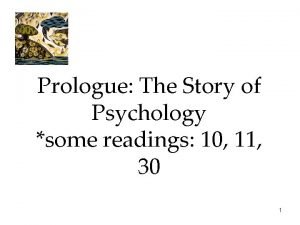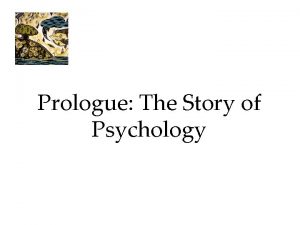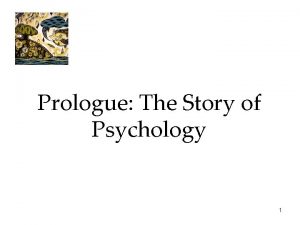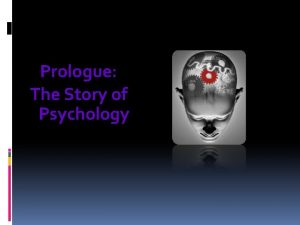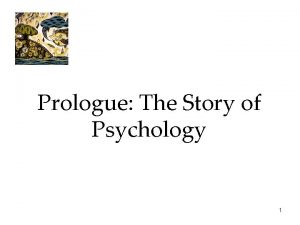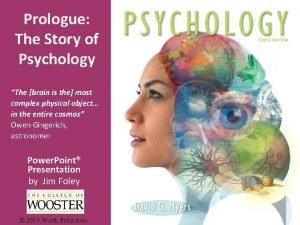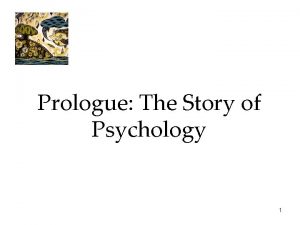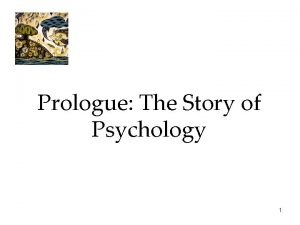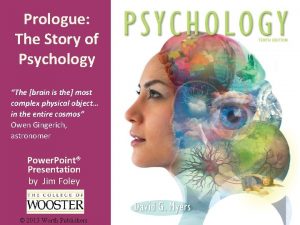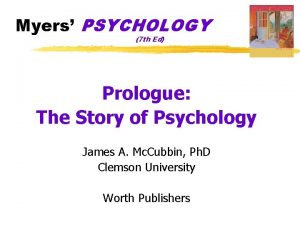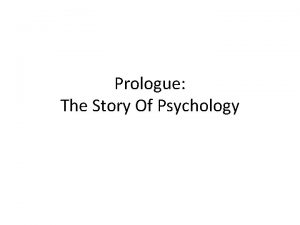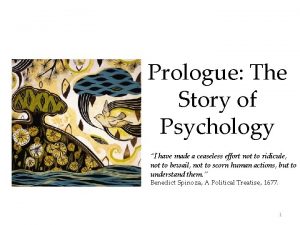The Story of Psychology Prologue What is Psychology































- Slides: 31

The Story of Psychology Prologue

What is Psychology? “The scientific study of behavior AND mental processes. ” § Uses scientific research methods § Behavior includes all observable behavior § Mental processes include thoughts, feelings & dreams…

Early Approaches of the 19 th Century § Structuralism – Focused on the basic structure of consciousness § Relied on introspection – the self-reporting of inner thoughts relating to simple experiences – The Problem: Training people to be introspective is difficult & people experience/report similar experiences differently

Famous Structuralists Wilhelm Wundt is known as the “Father of Modern Psychology” since he created the first psych lab in Leipzig, Germany in 1879 Edward Titchener (he studied under Wundt) and later established a lab at Cornell University

Early Approaches of the 19 th Century § Functionalism – Focused on how mental & behavioral processes function - how they enable the organism to adapt, survive, & flourish § Also relied on introspection Structuralism (builder) = basic structure (walls, floors, ceilings, etc. ) Functionalism (architect) = conscious function (organization, floor plan)

Famous Functionalists, Etc. William James is known as the “Father of American Psychology” since he was the first American to teach the subject in 1876 at Harvard (wrote the Principles of Psychology in 1890) Stanley Hall studied under James, created the first psych lab in America at Johns Hopkins & was the first president of the APA in 1892 Mary Whiton Calkins studied (animal research) under James at Harvard (denied Ph. D) & became the first female president of the APA in 1905 Margaret Floy Washburn was the first woman to be granted a Ph. D in Psychology by Cornell in 1894 (was 2 nd female president of the APA in 1921) Francis Cecil Sumer was the first African. American to be granted a Ph. D in Psychology (Neo-Freudian) by Clark University in 1920 Beverly Inez Prosser was the first African. American woman to be granted a Ph. D in Psychology (memory) by University of Cincinnati in the 1930 s

Early Approaches of the 19 th Century § Gestalt § Focused on how people construct “perceptual wholes” instead of focusing on the parts – Gestalt is German for “meaningful whole” § Focuses on perception & perceptual learning to understand the workings of the brain § Pretty much the exact opposite of the Structuralism approach

Famous Gestaltists Max Wertheimer Kurt Koffka Wolfgang Köhler

Smaller Aspects (lines, dots, curves, colors) v. Bigger Picture (man)

Emergence Dog is perceived as “a whole” rather than parts (ears, nose, tail, spots, etc. )

Multistability – The Necker Cube


The Psychodynamic Approach § Focuses on how behavior is affected by unconscious drives (dreams, etc. ) and conflicts § Behavior is explained through unconscious motivation and unresolved inner conflicts from one’s childhood - It is also known as the Psychoanalytic or Freudian approach

Famous Psychodynamic Psychologists Sigmund Freud Alfred Adler Carl Jung Karen Horney


The Behavioral Approach § Focuses on how we learn through rewards, punishment & observation (relies observable behaviors, not internal processes like the unconscious) § Behavior is explained by previous learning (conditioning)

Famous Behaviorists Ivan Pavlov John B. Watson Edward Thorndike B. F. Skinner


The Humanistic Approach § Focuses on how healthy people strive to reach their full potential (self-actualization) § Behavior is explained as being motivated by satisfying basic needs (hunger, thirst, etc. ), with the goal of reaching one’s full potential once basic needs are met. Behaviors are tied to feelings of self-worth.

Famous Humanists Abraham Maslow Carl Rogers Harry Harlow Mary Ainsworth Erikson

The Cognitive Approach § Focuses on how people interpret & mentally process their experiences § Behavior is explained by how a person interprets the situation - Mental processes = Cognitions = thoughts, feelings, expectations, perceptions, memories, etc.

Famous Cognitive Psychologists Howard Gardner Robert Sternberg Jean Piaget Konrad Lorenz

The Biological Approach § Focuses on how our biological structures and substances underlie behaviors § Behavior is explained by the workings & interrelationships of the brain, nervous system & endocrine system - A subdivision is the Evolutionary Approach which focuses on the fact that behavior is hereditary & adaptive (coded in genes & has developed over time)

Famous Biological Psychologists William James & Carl Lange Stanley Schachter Walter Cannon & Philip Bard

The Socio-Cultural Approach § Focuses on how our thinking and behavior change depending on the setting or situation § Behavior is explained by the influence of other people and social context &/or culture

Famous Social Psychologists Stanley Milgram Solomon Asch Phillip Zimbardo Albert Bandura


Psychologist v. Psychiatrist § Psychologist – branch of psychology that studies, assesses, and treats people with psychological disorders (requires an advanced degree) § Psychiatrist – branch of medicine dealing with psychological disorders (requires a medical degree - can prescribe drugs )



Summary § § § Structuralism = structure of mind Used introspection Functionalism = function of mind Gestalt = perceptual wholes (the big picture) § § § Behavioral = conditioning & observable actions Psychodynamic = unconscious mind Humanistic = development & self-fulfillment Biological = brain, nervous & endocrine systems Cognitive = thought/mental processes Socio-Cultural = social behaviors
 Prologue the story of psychology
Prologue the story of psychology The story of tom brennan quotes and techniques
The story of tom brennan quotes and techniques Hình ảnh bộ gõ cơ thể búng tay
Hình ảnh bộ gõ cơ thể búng tay Lp html
Lp html Bổ thể
Bổ thể Tỉ lệ cơ thể trẻ em
Tỉ lệ cơ thể trẻ em Voi kéo gỗ như thế nào
Voi kéo gỗ như thế nào Tư thế worms-breton
Tư thế worms-breton Bài hát chúa yêu trần thế alleluia
Bài hát chúa yêu trần thế alleluia Các môn thể thao bắt đầu bằng tiếng đua
Các môn thể thao bắt đầu bằng tiếng đua Thế nào là hệ số cao nhất
Thế nào là hệ số cao nhất Các châu lục và đại dương trên thế giới
Các châu lục và đại dương trên thế giới Công thức tính thế năng
Công thức tính thế năng Trời xanh đây là của chúng ta thể thơ
Trời xanh đây là của chúng ta thể thơ Mật thư tọa độ 5x5
Mật thư tọa độ 5x5 101012 bằng
101012 bằng độ dài liên kết
độ dài liên kết Các châu lục và đại dương trên thế giới
Các châu lục và đại dương trên thế giới Thể thơ truyền thống
Thể thơ truyền thống Quá trình desamine hóa có thể tạo ra
Quá trình desamine hóa có thể tạo ra Một số thể thơ truyền thống
Một số thể thơ truyền thống Cái miệng nó xinh thế
Cái miệng nó xinh thế Vẽ hình chiếu vuông góc của vật thể sau
Vẽ hình chiếu vuông góc của vật thể sau Nguyên nhân của sự mỏi cơ sinh 8
Nguyên nhân của sự mỏi cơ sinh 8 đặc điểm cơ thể của người tối cổ
đặc điểm cơ thể của người tối cổ V cc cc
V cc cc Vẽ hình chiếu đứng bằng cạnh của vật thể
Vẽ hình chiếu đứng bằng cạnh của vật thể Tia chieu sa te
Tia chieu sa te Thẻ vin
Thẻ vin đại từ thay thế
đại từ thay thế điện thế nghỉ
điện thế nghỉ Tư thế ngồi viết
Tư thế ngồi viết
